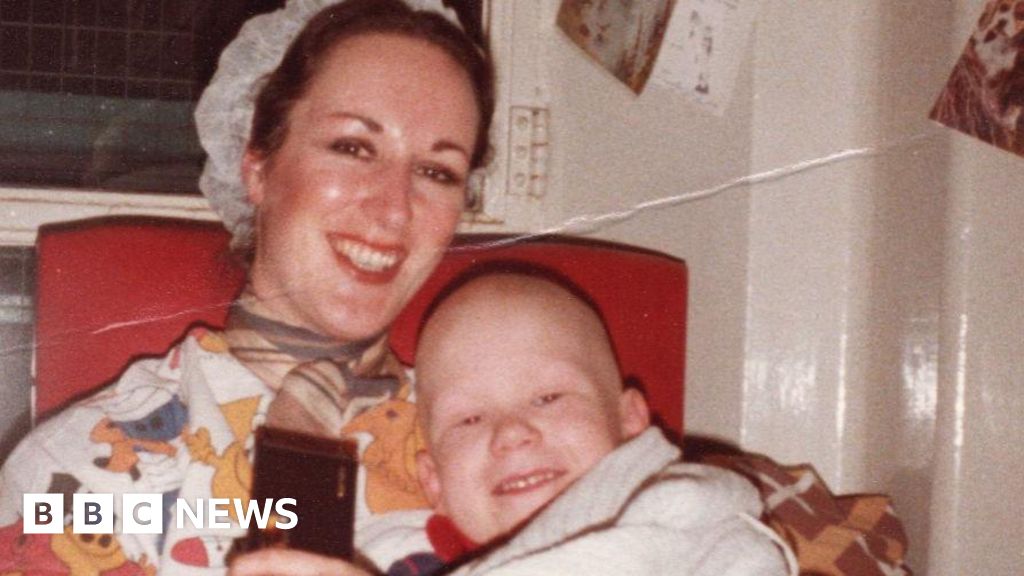A mother who admitted to giving her terminally ill child a fatally large dose of morphine to end his suffering in 1981, has died.
She had recently made the admission about her seven-year-old son Hamish in an effort to change the law on assisted dying.
The action is illegal in England and police previously said they were investigating the case.
- Author, Charlotte Andrews
- Role, BBC News
In a statement to the BBC, Mrs Cooper’s daughter, Tabitha, said: “She was peaceful, pain free, at home and surrounded by her loving family.
“It was exactly the way she wanted it. She lived life on her terms and she died on her terms.”
She also said that the family had been visited by officers from Thames Valley Police following the BBC News report last Wednesday about her brother’s death.
Hamish had stage 4 neuroblastoma, a rare and aggressive cancer that mostly affects children.
He had been in a lot of pain, Mrs Cooper told the BBC.
After 16 months of treatment, she said she had given him a large dose of morphine through his Hickman Catheter that “did quietly end his life”.
When asked if she understood she was potentially admitting to manslaughter or murder, she replied: “Yes.”
“If [the police] come 43 years after I have allowed Hamish to die peacefully, then I would have to face the consequences. But they would have to be quick, because I’m dying too,” she had said.
The BBC asked the 77-year-old if she believed her son knew she was intending to end his life.
She replied: “I feel very strongly that at the point of Hamish telling me he was in pain, and asking me if I could remove his pain, he knew, he knew somewhere what was going to happen.
“But I cannot obviously tell you why or how, but I was his mother, he loved his mother, and I totally loved him, and I was not going to let him suffer, and I feel he really knew where he was going.”
She continued: “It was the right thing to do. My son was facing the most horrendous suffering and intense pain, I was not going to allow him to go through that.”
She said his suffering and her own ill health had cemented her feelings on assisted deaths.
“We don’t do it [let them suffer] to our pets. Why should we do it to humans?” she said.
Campaigners for a so-called “right to die” have argued that people should be able to choose when and how to die in order to avoid suffering.
MPs recently discussed the issue at a parliamentary debate, at which the government said it was a matter of conscience for individual parliamentarians rather than one for government policy.
In 1982, after Hamish’s death, Mrs Cooper and her husband Alastair joined forces with another couple, Janet and Neville Oldridge.
The pair had also lost their five-year-old son Matthew to the same cancer.
Together, the couples formed The Neuroblastoma Society, which became Neuroblastoma UK in 2015, to raise awareness and money for research into the disease.
Mrs Cooper went on to author a book to help families and professionals working with ill children.
Titled This is Our Child: How Parents Experience the Medical World, the book includes the experiences of real-life parents and teenagers.
Assisted dying is the phrase used to describe a situation where someone who is terminally ill seeks medical help to obtain lethal drugs which they administer themselves. Assisted suicide, is helping another person end their life.
Both are illegal in the UK but recently, Scotland, Jersey and the Isle of Man all announced they are considering changing the law to let terminally ill people end their lives.
One hundred and ninety cases have been referred to the Crown Prosecution Service over a 15-year period. While most were not taken forward, there have been four successful prosecutions.
After Mrs Cooper spoke to the BBC last week, Thames Valley Police said in a statement it was “aware of reports relating to an apparent case of assisted dying of a seven-year-old boy in 1981”.
It added: “At this early stage, the force is making inquiries into these reports and is not in a position to comment further while these investigations continue.”
The force has been contacted for comment following her death.
If you have been affected by any of the issues in this story, the BBC Action Line has links to organisations which can offer support and advice

William Turner is a seasoned U.K. correspondent with a deep understanding of domestic affairs. With a passion for British politics and culture, he provides insightful analysis and comprehensive coverage of events within the United Kingdom.








